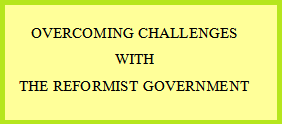Unemployment remains one of the most pressing challenges facing Africa today, posing a significant threat to peace and stability across the continent. The high rates of joblessness are not merely an economic issue, it is a crucial challenge that undermines social cohesion and fuels unrest. Particularly among the youth, that increases the rate of frustration due to the lack of opportunities.
Various factors contribute to the high unemployment rate in Africa, including ongoing conflict, civil war, political instability, and the adverse effects of climate change. Countries affected by civil wars often see their economies collapse, leading to widespread unemployment.
For instance, South Sudan, the Democratic Republic of the Congo and other the continent’s nations have seen their economies crumble under the weight of ongoing violence. When communities are wavering apart by conflict, job opportunities vanish and the workforce becomes increasingly dissatisfied. Young people, in particular, are often left without paths to contribute to society, leading to frustration and, in some cases, radicalization.
Additionally, climate change has devastating effects on agriculture, a primary source of employment for many Africans. Droughts and floods disrupt livelihoods, forcing people to migrate to urban areas in search of work, which cities are often ill-equipped to handle.
Furthermore, political instability further exacerbates the unemployment crisis. Governments struggling to maintain control or legitimacy often fail to implement effective economic policies. In nations with frequent changes in leadership or governance crises, investment decreases, and businesses hesitate to expand or hire. This cycle of instability creates an unemployment flourishes, spreading poverty and social unrest.
Many African countries rely heavily on agriculture, which is highly susceptible to climatic shifts. Droughts and floods have become increasingly common, devastating crops and livelihoods. As farmers lose their income, rural unemployment surges, forcing many to migrate to urban areas in search of work. Unluckily, cities often cannot absorb this influx of labor, leading to increased competition for scarce jobs and, subsequently, higher unemployment rates.
Addressing unemployment rate, various countries ladders and officials gathered in one avenue at Addis Ababa that discussed on the reduction of unemployment rate in the country as well as the continent.
At the 20th International Labour Organization (ILO) Regional Conference for Labour-Based Practitioners, held at the African Union Headquarters in Addis Ababa.
Speaker of the House of Peoples’ Representatives, Tagese Chafo, emphasized the critical importance of continent-wide solidarity in addressing poverty and inequality through job-intensive investment strategies.
In a recent address, Minister Chaltu Sani outlined the pressing challenges humanity faces today. She highlighted that we are at a pivotal moment, grappling with intricate issues such as sluggish economic growth, climate change, the digital divide, and geopolitical conflicts. These factors contribute to rising unemployment especially among youth alongside poverty, displacement, and inequality across the globe.
Drawing on Ethiopia’s experience, the Speaker outlined how successive development plans and comprehensive policy reforms have been implemented to confront significant challenges such as poverty and social disparities.
He noted Ethiopia’s commitment to balancing environmental sustainability with employment goals, citing flagship initiatives like the Green Legacy program aimed at promoting ecological health while expanding access to vital infrastructure and public services.
Tagese affirmed the success of these initiatives, stating that Ethiopia’s focused development programs have not only enhanced the living standards for millions but have also created thousands of job opportunities nationwide.
Chaltu reaffirmed Ethiopia’s commitment to the Employment-Intensive Investment Program (EIIP), emphasizing that the government believes employment is crucial for fostering inclusive economic growth and social justice. She noted that the conference serves as a platform for demonstrating a collective dedication to job creation, poverty alleviation, and equitable access to employment.
The minister pointed out the global challenges impeding job creation, including climate change and technological disparities, stressing the need for innovative and decisive solutions. This is particularly urgent for Ethiopia, where unemployment and climate issues pose serious risks.
Chaltu emphasized Ethiopia’s strong partnership with the International Labour Organization, reiterating the government’s commitment to sustainable development and community resilience.
She called for enhanced collaboration between governments, educational institutions, and the private sector to meet shared developmental goals. Ethiopia is fully prepared to ensure the conference’s success, with the government focusing on actionable policies and programs that adhere to international standards, she concluded.
In her part, Ethiopia’s Planning and Development Minister, Fitsum Assefa, underscored the critical nature of inclusive growth for achieving economic stability. She stated, “Without inclusive growth, no country can attain true economic stability.”
Since the launch of the Homegrown Economic Reform in 2019, significant transformations have occurred in the private sector, particularly in finance, logistics, and telecommunications, according to her.
The adoption of market-driven foreign exchange rates has been pivotal in attracting investment and generating quality jobs. Fitsum reported a substantial rise in per capita GDP, which has now reached nearly 2,000 USD, alongside a marked reduction in poverty levels.
Key government initiatives include the establishment of industrial parks and special economic zones designed to draw both local and foreign investment. Currently, there are ten operational special economic zones, two industrial parks, and one free trade area, targeting sectors that promise substantial job creation, such as textiles, pharmaceuticals, and food processing. Since 2022, these initiatives have created over 100,000 jobs in industrial parks.
The horticulture sector has also been a significant contributor, generating 200,000 jobs, primarily benefiting women and reflecting the government’s commitment to gender-inclusive employment.
Additionally, the Prime Minister’s Green Legacy Initiative has created more than one million green jobs, again with a focus on supporting women, highlighting the government’s dedication to sustainable job creation.
Labor and Skills State Minister Teshale Berecha discussed Ethiopia’s employment policies, which prioritize “decent job creation, fair pay, and safe working conditions.” He emphasized the importance of leveraging the potential of Ethiopia’s youth, with nearly two million young people entering the job market each year.
“Our employment policy aims to tap into this valuable potential,” he stated. The government plans to create 20 million jobs over the next decade, focusing on inclusivity and sustainability.
Teshale noted that Ethiopia’s comprehensive economic reform and job creation strategy exemplifies a commitment to fostering a resilient labor market for all citizens.
The positive impacts of these reforms are evident, with Ethiopia’s urban economy experiencing robust growth, achieving twice the GDP growth rate of the Sub-Saharan Africa average, thus ensuring resilience in the face of various challenges.
International Labour Organization Director General, Gilbert F. Houngbio, on his part said despite progress in many areas access to productive and descent employment remains a pressing concern across the African continent.
We do have the capacity to address the intertwined challenges of poverty unemployment and inequality, he said.
Tagese called for urgent coordinated efforts to ensure sustained and inclusive economic growth, productive employment, and decent work opportunities for all. He highlighted the necessity for African nations to unite and collaboratively identify effective strategies that prioritize employment-intensive approaches in both national and local economic development initiatives.
BY FIKADU BELAY
THE ETHIOPIAN HERALD SATURDAY 31 MAY 2025



